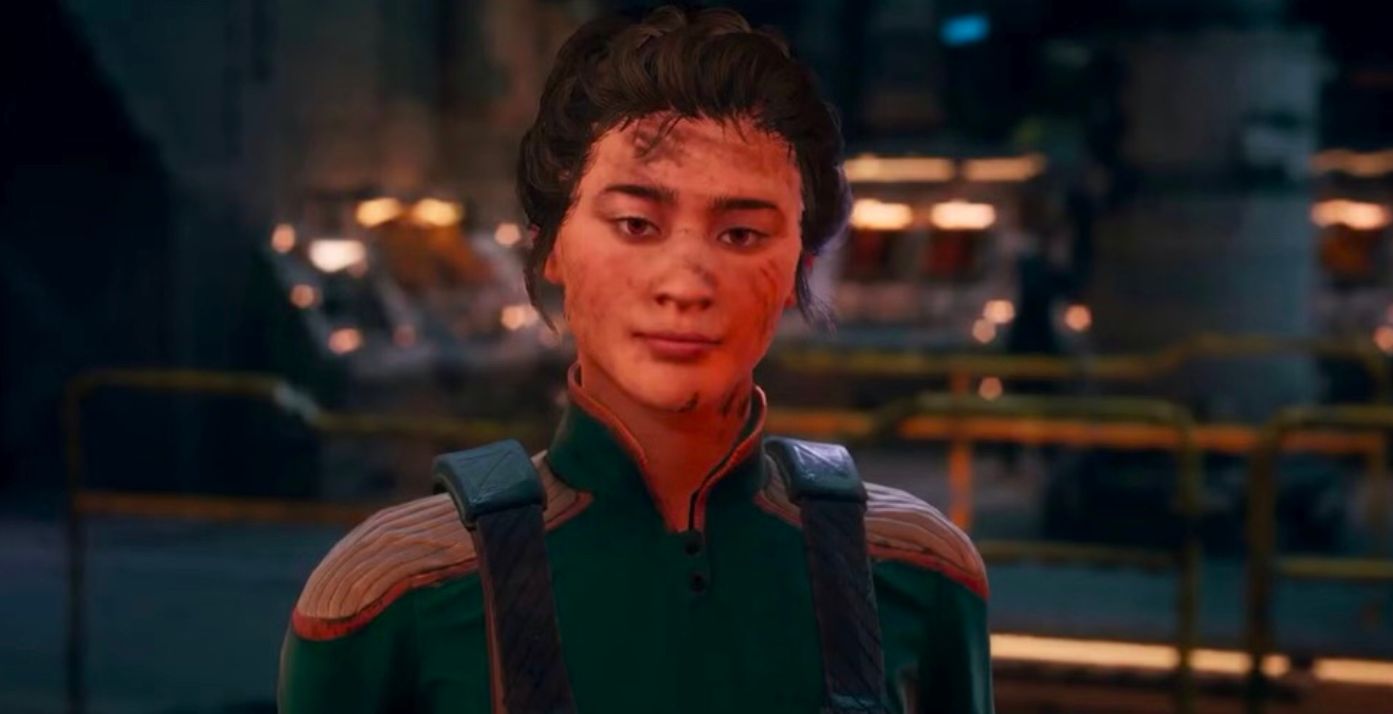When Obsidian Entertainment announced The Outer Worlds, one of the first aspects of the game they were asked about was the ability to romance companions. To the disappointment of many, this feature did not make it into the game. However, just because the player couldn’t romance companions didn’t mean love would be absent from the game.
The first companion players can meet on their journey is the charming, loveable, and socially awkward engineer Parvati (Ashley Birch, Horizon: Forbidden West). And if players made the right decisions, they could aid this sweetheart through one of the most heartfelt love stories gaming has ever produced.
The key element that allows Parvarti’s story to deliver such a unique representation of love is that it doesn’t involve the player character directly. This frees the game to tell a story that doesn’t have to mold itself to what the player sees their character as. Rather than tailoring the narrative to a story that fits with the confidence many like to project into their virtual avatars, Parvati’s story creates a far more authentic look at love, awkwardness, and all. And it sure does get awkward.
As the friend providing emotional support for the confused and often scared Parvati, the player sees the fearful worries of new love from a more detached viewpoint. Stepping in to coach, nudge, and celebrate their companion’s growth as a person builds a familial bond that gaming rarely produces. Even as the uncertainty expands beyond Parvati herself.
Awkwardness breathes authenticity into Parvati and Junlei’s romance.

The object of Parvati’s affection is the captain of the Groundbreaker, Junlei Tennyson (Michelle Rambharose). While not as socially awkward as Parvarti, Junlei struggles to present her feelings clearly. This leads to greater uncertainties as neither character can just come out and say what they feel at first. This mutual hardship in presenting their feelings further builds the tale’s authenticity.
There is often a confident side of a couple willing to take the lead, but this is far from a universal truth. Letting players see the uncertainty grow into confidence throughout Parvati’s story showcases that the leader/follower dynamic isn’t the only one relationships can be built on.
It does so without requiring the player to compromise their vision of who they are in the world since they cannot be the ones romancing the young engineer. The ability to allow the uncertainty and awkwardness of new love to shine isn’t the only reason why Parvti’s story is so special. It also manages to avoid one of the medium’s biggest pitfalls concerning romance: the final goal.
Ever since the Mass Effect Trilogy, companion romances have not only been an expected element of squad-based RPGs, but the focus of these sub-narratives is generally always the same. The implied goal of the romance is to get the chosen ally in bed for a passionate night of pleasure before the game sends its heroes on their final battle against whatever foe threatens them.
Sex is a common element of romantic intimacy, and I’m not here to say it shouldn’t be in games. However, frequently the focus on the “reward” of a love scene often feels like it outweighs the supposed romance that is supposed to be taking place. Gamifying love can overshadow the little moments that are just as, if not more important than, a night in bed.
The Outer Worlds romance that matters has nothing to do physical intimacy, and that’s good.

Parvati’s story removes the need for any such focus. Not only would it be crude for the game to allow the player to pry into any physical intimacy that the budding couple may share, but Obsidian went a step further than that by having Parvati be uninterested in physical intimacy. This removes any possibility of a “sex as the goal” narrative from playing out.
While Parvati’s preferences towards intimacy help The Outer Worlds avoid framing her romance too heavily with the physical side of it, it also showcases a group of people almost universally overlooked in the medium. Some people can love as deeply and fiercely as anyone else but have no interest in getting physical with it.
The lack of physical interest can often be interpreted as cold or distant, something that Parvati admits has been a struggle for her in the past. One of her biggest fears is how Junlei will react to her disinterest in this area of love. By letting Parvati have these feelings, the story presents players with a romance that pushes the concept that love can blossom without the promise of physical intimacy. And that is an important message that doesn’t get said enough.
Parvati’s romance, from its shy beginnings to its eventual celebratory conclusion, is special. Its de-emphasis on sex, its allowance to let both parties be vulnerable, and how it enables the player to stand beside their friend, aiding them on their journey, makes this side plot to The Outer Worlds a truly special reflection on romance. It will be interesting to see how the upcoming follow-up game will deliver an equally unique and memorable story of love.







